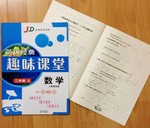题目内容
【题目】短文改错
Last week our class hold a discussion about whether we should have a picnic. I first raised myself hand, and soon classmates joined in this longer discussion.
Some thought it interested for all of us to get closely to nature. We were so tired that we wanted have a break as soon as possible. However, others said they would rather stay at home than going out for a picnic. They explained it that a picnic would not make them relaxed but more tired. At the end of the class, we voted but agreed to go to the open air, make me feel very happy.
【答案】1. 第一句话中hold→held
2. 第二句话中myself→my
3. 第二句话中longer→long
4. 第三句话interested→interesting
5. 第三句话中closely→close
6. 第四句话中wanted后加to
7. 第五句话中going→go
8. 第六句话中去掉it
9. 第七句话中but→and
10. 第七句话中make→making
【解析】
这是一篇记叙文。文章讨论了上周我们班级讨论我们是否应该去野餐的事件。
1. 考查一般过去时。句意:上周我们班举行了关于是否应该去野餐的讨论。由“Last week(上周)”可知,这句话应使用一般过去时。故将hold改为held。
2. 考查物主代词。句意:我首先举起了我的手,然后不久我的同学也加入了这个漫长的讨论中。myself(我自己)是反身代词,不能用来修饰名词,修饰名词需要用物主代词,故将myself改为my。
3. 考查形容词。句意同上。本文中只论述这一次discussion(讨论),没有与其它的讨论比较时间长短,不需要用形容词比较级修饰。故将longer改为long。
4. 考查形容词。句意:一些人认为对于我们所有人来说去接近自然是很有趣的。“有趣的”在这句话中作宾语补足语,并且用来修饰it(to get close to nature)这件事情,所以应用interesting。“-ing”形容词,意为“令人……的”,主要用于说明事物,描述事物对人的影响。“-ed”形容词,意为“感到……的”,主要用于说明人,描述人对事物的感受。故将interested改为interesting。
5. 考查形容词。句意同上。“get close to”意为“接近,靠近”,其中“get”在这里是系动词,需要接一个形容词作表语,但closely是副词,不是形容词。故将closely改为close。
6. 考查不定式。句意:我们如此累以至于我们想尽快休息一下。“想要做某事”是还没有做的事情,所以应用不定式作宾语。故在wanted后加to。
7. 考查不定式。句意:然而,有些人说他们宁愿待在家也不想出去野餐。“would rather do A than do B”意为“宁愿……而不愿……”,其中than的前后是平行结构,即在than 的前后要用两个同类的词或词组,如两个名词、两个不定式、两个介词短语等。故将going改为go。
8. 考查宾语从句。句意:他们解释到野餐不会使他们感到轻松反而会使他们感到更累。这是一个宾语从句,explain后解释的内容是一个完整的句子,可以直接用连接词that连词。故将it去掉。
9. 考查连词。句意:在课堂快结束的时候,问妈投票并决定了去户外,我很高兴。我们投票的结果是去户外,vote与agree之间是一致关系,不是转折关系,故将but改为and。
10. 考查现在分词。句意同上。由于这个决定使的我很开心,这个决定与make之间是主动关系,故用现在分词作状语。故将make改为making。

 黄冈经典趣味课堂系列答案
黄冈经典趣味课堂系列答案 启东小题作业本系列答案
启东小题作业本系列答案【题目】请阅读下面短文,并根据所读内容在文章后表格中的空格里填入一个最恰当的单词。
注意:每个空格只填一个单词。
You can relax if remembering everything is not your strong suit. Recent research makes the case that being forgetful can be a strength—in fact, selective memory can even be a sign of stronger intelligence.
Traditional research on memory has focused on the advantages of remembering everything. But looking through years of recent memory data, researchers Paul Frankland and Blake Richards of the University of Toronto found that the neurobiology(神经生物学) of forgetting can be just as important to our decisionmaking as what our minds choose to remember.
“The goal of memory is not the transmission of information through time. Rather, the goal of memory is to help improve decisionmaking. As such, transience(转瞬即逝) is as important as persistence in memory systems,” their study in Neuron states.
Making intelligent decisions does not mean you need to have all the information at hand, it just means you need to hold onto the most valuable information. And that means clearing up space in your memory palace for the most uptodate information on situations. Our brains do this by generating new neurons(神经元) in our hippocampus(海马体), which have the power to overwrite existing memories that are influencing our decisionmaking.
“If you're trying to deal with the situation and your brain is constantly bringing up multiple conflicting memories, that makes it harder for you to make a wise decision,” Richards told Science Daily.
If you want to increase the number of new neurons in your brain's learning region, try exercising. Moderate aerobic exercise like jogging, power walking, and swimming have been found to increase the number of neurons making important connections in our brains.
When we forget the names of certain clients and details about old jobs, our brain is making a choice that these details do not matter. Although too much forgetfulness can be a cause for concern, the occasional lost detail can be a sign of a perfectly healthy memory system. The researchers found that our brains facilitate decisionmaking by stopping us from focusing too much on minor past details. Instead, the brain promotes generalization, helping us remember the most important gist of a conversation.
“One of the things that distinguishes an environment where you're going to want to remember stuff versus an environment where you want to forget stuff is this question of how consistent the environment is and how likely things are to come back into your life,” Richards said.
If you're an analyst who meets with a client weekly, your brain will recognize that this is a client whose name and story you need to remember. If this is someone you may never meet again, your brain will weigh that information accordingly.
These findings show us that total recall can be overrated. Our brains are working smarter when they aim to remember the right stories, not every story.
Title:Being Forgetful Might Actually Mean You're 【1】
Introduction | Recent research proves that being forgetful can be a strength, for forgetting and selective memory are of 【2】importance in our decisionmaking. | |
The goal of memory | People take advantage of memory to make good decisions rather than 【3】 information. | |
【4】 of being forgetful | It helps us forget outdated information. | ●Making wise decisions involves the existing memories making 【5】for the latest information. ●Meanwhile, too much contradictory information in memory can do harm to our decisionmaking. ●Exercising helps increase neurons, contributing to our 【6】 decisionmaking. |
It helps us see the big 【7】. | ●After 【8】the information it gets, the brain chooses to focus on the key points, occasionally forgetting unimportant past details. ●Whether to remember or forget particular stuff is 【9】by the degree of the consistency of the environment and the 【10】 of things reappearing later in life. | |
Conclusion | Our brains are working smarter when aiming to remember the right stories, not every story. | |